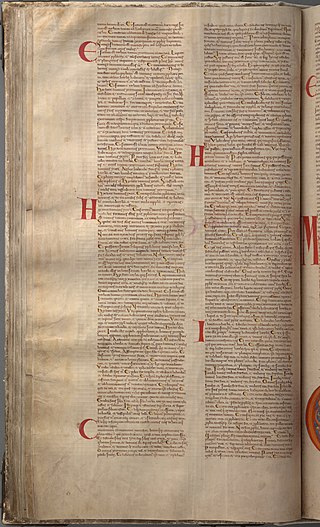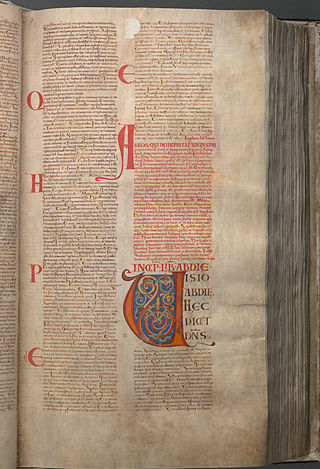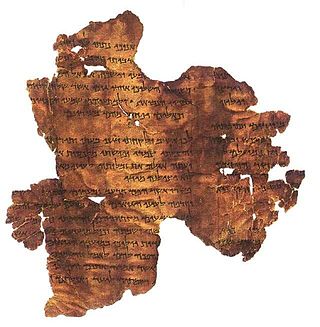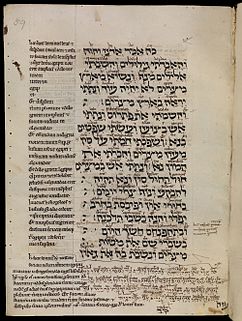The Book of Nahum is the seventh book of the 12 minor prophets of the Hebrew Bible. It is attributed to the prophet Nahum, and was probably written in Jerusalem in the 7th century BC.
Isaiah 7 is the seventh chapter of the Book of Isaiah in the Hebrew Bible or the Old Testament of the Christian Bible. This book contains the prophecies attributed to the prophet Isaiah and is one of the Books of the Prophets.
Isaiah 23 is the twenty-third chapter of the Book of Isaiah in the Hebrew Bible or the Old Testament of the Christian Bible. This book contains the prophecies attributed to the prophet Isaiah, and is one of the Books of the Prophets. This chapter foretells the destruction of Tyre due to its pride, its rising again, and its conversion to God.
Isaiah 30 is the thirtieth chapter of the Book of Isaiah in the Hebrew Bible or the Old Testament of the Christian Bible. This book contains the prophecies attributed to the prophet Isaiah, and is one of the Books of the Prophets. The Jerusalem Bible groups chapters 28-35 together as a collection of "poems on Israel and Judah". The Cambridge Bible for Schools and Colleges describes this chapter as "a series of Oracles dealing with the Egyptian Alliance and its consequences; the present state and future prospects of Israel, and the destruction of the Assyrians".
Isaiah 31 is the thirty-first chapter of the Book of Isaiah in the Hebrew Bible or the Old Testament of the Christian Bible. This book contains the prophecies attributed to the prophet Isaiah, and is one of the Books of the Prophets. The Jerusalem Bible groups chapters 28–35 together as a collection of "poems on Israel and Judah". Biblical commentators Keil and Delitzsch note that "again and again", Isaiah returns to the subject of Judah's alliance with Egypt, this chapter being a notable example.
Isaiah 36 is the thirty-sixth chapter of the Book of Isaiah in the Hebrew Bible or the Old Testament of the Christian Bible. This book contains the prophecies attributed to the prophet Isaiah, and is one of the Books of the Prophets. The text, describing the invasion of the Assyrian king Sennacherib to the Kingdom of Judah under Hezekiah.
Isaiah 37 is the thirty-seventh chapter of the Book of Isaiah in the Hebrew Bible or the Old Testament of the Christian Bible. This book contains the prophecies attributed to the prophet Isaiah, and is one of the Books of the Prophets.

Micah 1 is the first chapter of the Book of Micah in the Hebrew Bible or the Old Testament of the Christian Bible. This book contains the prophecies attributed to the prophet Micah, and is a part of the Book of the Twelve Minor Prophets.

Zechariah 10 is the tenth of the 14 chapters in the Book of Zechariah in the Hebrew Bible or the Old Testament of the Christian Bible. This book contains the prophecies attributed to the prophet Zechariah, and is a part of the Book of the Twelve Minor Prophets. This chapter is a part of a section consisting of Zechariah 9–14.

Amos 6 is the sixth chapter of the Book of Amos in the Hebrew Bible or the Old Testament of the Christian Bible. In the Hebrew Bible it is a part of the Book of the Twelve Minor Prophets. This book contains the prophecies attributed to the prophet Amos. The Jamieson-Fausset-Brown Bible Commentary summarises this chapter as
[a] denunciation of both the sister nations for wanton security — Zion, as well as Samaria: threat of the exile: ruin of their palaces and slaughter of the people: their perverse injustice.

Hosea 7 is the seventh chapter of the Book of Hosea in the Hebrew Bible or the Old Testament of the Christian Bible. In the Hebrew Bible it is a part of the Book of the Twelve Minor Prophets. The book contains the prophecies attributed the prophet Hosea, son of Beeri, and this chapter is about Israel reproved for multiple sins resulting in God's wrath against them for their hypocrisy.

Hosea 11, the eleventh chapter of the Book of Hosea in the Hebrew Bible or the Old Testament of the Christian Bible, has been called "one of the high points in the Old Testament". In the Hebrew Bible is a part of the Book of the Twelve Minor Prophets. According to the Jamieson-Fausset-Brown Bible Commentary, this chapter contains prophecies attributed to the prophet Hosea, son of Beeri, about God's former benefits, and Israel's ingratitude resulting in punishment, but God still promises restoration.

Hosea 12 is the twelfth chapter of the Book of Hosea in the Hebrew Bible or the Old Testament of the Christian Bible. In the Hebrew Bible it is a part of the Book of the Twelve Minor Prophets. This chapter contains prophecies attributed to the prophet Hosea, son of Beeri, delivered about the time when the Kingdom of Israel (Ephraim) sought the aid of the Egyptian king So, in violation of her covenant with Assyria. References to contemporary events sit alongside allusions to the patriarchal age in Israel's history. Hosea exhorts the country's leaders to follow their father Jacob's persevering prayerfulness, "which brought God's favor upon him". The Jamieson-Fausset-Brown Bible Commentary notes that "as God is unchangeable, He will show the same favor to Jacob's posterity as He did to Jacob, if, like him, they seek God".

Ezekiel 5 is the fifth chapter of the Book of Ezekiel in the Hebrew Bible or the Old Testament of the Christian Bible. This book contains the prophecies attributed to the prophet/priest Ezekiel, and is one of the Prophetic Books. This chapter contains the prophecies using the division of the prophet's shaved hair as a sign, showing God's judgment upon Jerusalem, by pestilence, by famine, by the sword, and by dispersion. The siege is described again in chapter 6.

Ezekiel 10 is the tenth chapter of the Book of Ezekiel in the Hebrew Bible or the Old Testament of the Christian Bible. This book contains the prophecies attributed to the prophet/priest Ezekiel, and is one of the Books of the Prophets. In this chapter, Ezekiel sees "God's Glory depart from the Temple".

Ezekiel 11 is the eleventh chapter of the Book of Ezekiel in the Hebrew Bible or the Old Testament of the Christian Bible. This book contains the prophecies attributed to the prophet/priest Ezekiel, and is one of the Books of the Prophets. In this chapter, Ezekiel pronounces judgment on Jerusalem's "wicked counsellors" and promises that God will restore Israel.

Ezekiel 16 is the sixteenth chapter of the Book of Ezekiel in the Hebrew Bible or the Old Testament of the Christian Bible. This book contains prophecies attributed to the prophet/priest Ezekiel, and is one of the Books of the Prophets. Biblical scholar R. E. Clements calls this chapter "an Old Testament parable of the prodigal daughter", describing a shocking illustration of ungrateful Jerusalem in contrast to God's enduring love to her. This chapter is often linked to Ezekiel 23, which deals with two daughters, symbolizing the Kingdoms of Israel and Judah.

Ezekiel 31 is the thirty-first chapter of the Book of Ezekiel in the Hebrew Bible or the Old Testament of the Christian Bible. This book contains the prophecies attributed to the prophet/priest Ezekiel, and is one of the Books of the Prophets. In the New King James Version, this chapter is sub-titled "Egypt Cut Down Like a Great Tree".

Ezekiel 32 is the thirty-second chapter of the Book of Ezekiel in the Hebrew Bible or the Old Testament of the Christian Bible. This book contains the prophecies attributed to the prophet/priest Ezekiel, and is one of the Books of the Prophets. This chapter contains two revelations from God regarding Egypt and its Pharaoh, concluding Ezekiel's prophecies against Egypt.

Ezekiel 41 is the forty-first chapter of the Book of Ezekiel in the Hebrew Bible or the Old Testament of the Christian Bible. This book contains the prophecies attributed to the prophet/priest Ezekiel, and is one of the Books of the Prophets. The Jerusalem Bible refers to the final section of Ezekiel, chapters 40-48, as "the Torah of Ezekiel". This chapter continues Ezekiel's vision of a future Temple.







